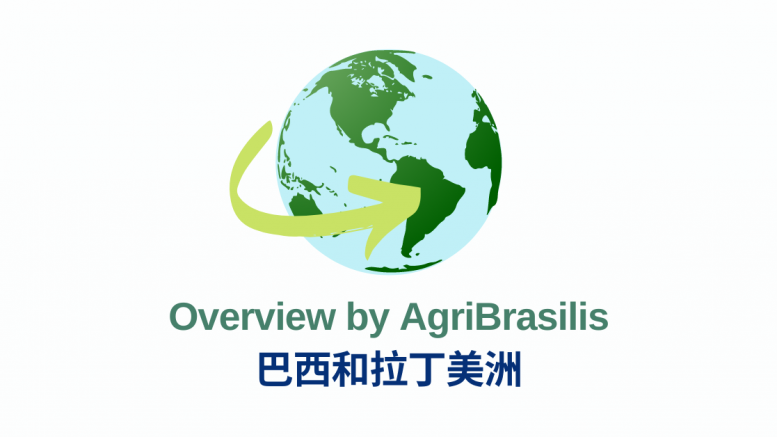Coffee production fell 13% in the past 12 months in Colombia
Soybean area should reach 4.9 million/ha in the 2023/24 season, compared to 4.6 million/ha in 2022/23. In 2023/24, for each hectare planted with wheat and corn, another 1.75 will be planted with soybean. (Rosario Stock Exchange)
Country has 9 economic sectors in crisis. Cotton, grains, wines and milk are the most affected. Drought, frost and hail are identified as the main causes for problems in agriculture. Among all 19 economic sectors mapped in the country, only yerba mate and poultry farming are growing. (Coninagro)
![]()
Embrapa and the Ministry of Agriculture estimate a growth of 24% in Brazilian grain production over the next ten years. The increase should happen mainly in soybean, in the off-season corn and cotton. The grain area should reach 92.3 million hectares, while production should reach 390 million tonnes. (MAPA)
Cocoa grinding grew 19.19% in the 1H of 2023, reaching 126 thousand tonnes, compared to 106 thousand tonnes in the same period of 2022. States of Bahia and Espírito Santo were the main ones to receive cocoa beans for the industry, with 96% of the total volume. (Association of Cocoa Processing Industries)
Governor of the State of Santa Catarina, Jorginho Mello, received the Japanese ambassador to discuss the resumption of poultry exports to the country, suspended after the outbreak of Avian Influenza. About 34% of chicken exports to Japan come from Santa Catarina, reaching 12 thousand tonnes per month. (Government of Santa Catarina)
National Supply Company – Conab and the Ministry of Agrarian Development signed a technical cooperation agreement. The agreement defines that at least 30% of food purchases by federal agencies must come from family farming. Edegar Pretto, director of Conab, stated that “the agreement we signed today shows farmers that we are going to expand the purchase of products that come from family farming, peasants, indigenous people, women…” (Conab)
Ministry of Agriculture estimates the Gross Value of Agricultural Production (GVP) for 2023 at US$ 240 million, 2.6% higher than the GPV for 2022. Despite the decrease seen in the livestock category, crops boosted the GVP by 4.9%. (MAPA)
Government’s proposal to increase ethanol in gas from 27% to 30% would lead the use of an additional 3.5% of the country’s recoverable sugar to produce the fuel, according to a study performed by Citi Research. Analyst Gabriel Barra said that passing of this law could increase ethanol consumption by 1.2 billion liters in 2024/25, reaching 36 billion liters. (Citi Research)


Coffee production fell 13% in the past 12 months, from 12.3 million bags to 10.7 million, due to increased rainfall in coffee farming regions. Brazilian coffee was one of the most requested by Colombia, with an increase in imports of 38.9% compared to the previous cycle. (National Federation of Coffee Farmers)

Ecuador is considering importing rice from Mercosur member countries, because of the low stocks of the grain. Deficit production reaches 200,000 tonnes, caused by problems with the crops. The first cargo, of 30,000 tonnes, has already been imported from Colombia. Imports from Brazil, Uruguay and Argentina are also planned. Minister Eduardo Izaguirre said that “The entire continent is experiencing problems with rice crops, so we intend to bring the price back to our normal range, between US$ 3.2 and US$ 3.5.” (Ministry of Agriculture and Livestock)

Prices of products made from wheat and corn may oscillate from 3% to 5%, as a result of the Russian blockade of ships transporting cereals from Ukraine across the Black Sea. “What most affects the price of grains is not so much what happens with Ukrainian grains, but with Russian wheat, because Russia imposes many conditions on importing countries, such as the payment in rubles, to avoid the devaluation of its currency,” commented the president of the Agricultural Markets Consultant Group, Juan Carlos Anaya. (GCMA)


Ministry of Agriculture and Livestock approves HB4 transgenic wheat, tolerant to drought and to glufosinate ammonium. The gene from sunflower plants can now be introduced in wheat improvement programs to have ready-made varieties and to sell seeds in four to five years. (Institute of Agricultural Biotechnology)
![]()
Climate change affected the weight of Hass avocados, making fruits up to 15% smaller. The projection of exports fell to 598 thousand tonnes, compared to 630 thousand estimated in March. (ProHass)
Estimated decrease in cocoa yields from 800 tonnes to 700 tonnes/ha. This year, fruit growing areas faced intense rainfall and cold temperatures, increasing pests and diseases, such as Moniliasis and Phytophthora. Shipments for 2023 are estimated at US$ 350 million, surpassing the US$ 320 million of 2022. (Asociación Peruana de Productores de Cacao)

READ MORE:
Booming Hass Avocado Market in Brazil

